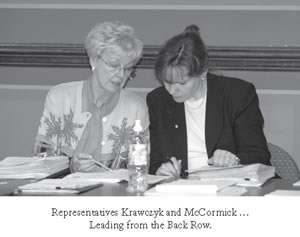 I worked on two very important pieces of public policy during my first session in the Wisconsin legislature. One, I fell in to quite accidentally; the other was no doubt intended to keep me out of trouble and busy.
I worked on two very important pieces of public policy during my first session in the Wisconsin legislature. One, I fell in to quite accidentally; the other was no doubt intended to keep me out of trouble and busy.
My strength in politics lies in the fact that I dislike the injustice of politics.
Instead, I am wired to solve problems and look at the system as a whole. Dollars and cents do not factor into my judgments, unless it has to do with cost analysis and fiscal impact on families and on jobs. All decisions and actions that integrity-driven legislators make are based on values and convictions. Some people call this a moral compass; some a center of gravity. I’d like to refer to it as simply having heart.
When an individual in public service has heart, he or she feels compassion and empathy for others. More important, there is a direct and intentional focus on others. Solving problems and making a difference for others is a common core value among legislators with heart. In contrast, the politician or political hack is consumed with the “me” game of politics, which translates to the need for power and control.
THE CRANDON MINE AMENDMENT
There are not too many people’s instincts that I would take over facts and logic, but my own instincts are one exception, and that colleague sitting in the back row with me is another. I was drawn into a crisis situation that was about as popular as a fart in church. Rep. Krawczyk was not just a legislative colleague; she was a kindred spirit. My house district and hers had one common denominator: water, and lots of it. She represented the Bay of Green Bay; I represented the Wolf River Basin, Fox River and Lake Winnebago.
The Crandon Mine issue had been debated for years and was on schedule by my party’s front row to be pushed through for a vote. My involvement seemed innocent enough—make sure the methods used to carry the tailings (residue from the mining expedition) were safe and that they were being disposed of in an appropriate manner. Rep, Krawczyk insisted that her nose smelled trouble, and the ground water itself was in jeopardy.
The Crandon Mine sat at the head of all of the water that both of us represented in our districts.A misstep with the Crandon Mine could mean that pollution would literally be flushed throughout the Wolf River Basin like a toilet, impacting 40 percent of all surface water in the state. Krawczyk and I had only been in office for a few months when her instincts kicked in and her hand pulled on my sleeve. She urged me to find a way to check on the mining operation and its potential impact on the surface water. Krawczyk could cook; I could research and write public policy. It was not long before the two of us made a nightly ritual
of eating at her apartment and studying alternatives to burying mining waste at the top of the water basin. Both of us were conservatives in the tradition of Teddy Roosevelt, which meant natural resources had value and needed conserving. Such was the case in the attempt to reopen a mine in Crandon, Wisconsin. The best interests of the general public were bantered about, with the topic of jobs versus water; and then jobs versus tourism jobs. Most important to this discussion was Rep. Judy Krawczyk’s smell test—the issue just didn’t smell right.
A formidable mining project—backed by party elites in both front rows in both political parties—was being pushed through for a vote after several years of heated debate and stalls. Who was I? I was only a freshman and worse, I was listening to another freshman’s instincts. My problem was that I didn’t vote on things until I read the fine print and did the research the best I could. Sometimes the facts and impacts were not easily discernable. At other times, the facts and research were hidden from our view and replaced with marketing spin. One point became increasingly clear: it was time I began to do independent research on the mining company and its history.
Graduate coursework I had conducted in the early 1980s in Windsor, Ontario, led me to some professional contacts. My first call was to an urban planner and colleague in the Canadian government. Canada had long led the United States in conservation issues; their economy depends on tourism. In my years of graduate study in Windsor, I grew familiar with Great Lakes issues and water issues in particular. The Great Lakes Commission and its influence on city planning commissions throughout Canada led me to the provincial government. Through the years I had maintained contact with a knowledgeable and wellconnected city planner in the province of Ontario, Dennis Gratton. Gratton was in the Ottawa office when he took my call. “Dennis, have you heard of the Australian Mining Company?” I asked.
“That company is working inordinately hard to influence Wisconsin legislators on the Crandon Mine project in my state,” Dennis responded in a supportive tone. “Let me look into things on this end and see if they come up on any of our government radar screens.” It didn’t take long before Dennis Gratton got back to me with his response. “Terri, that mining company left the province of Ontario with $1.5 billion in cleanup costs.”
I asked him to fax all of the supporting documents he had, as well as contacts he used, so that I could verify all the documents independently. It appeared that my concern was justified. The potential impact of the mining company could affect water quality for the state of Wisconsin and the Wolf River Basin for generations to come. The political argument before the legislature favoring the mining operation was that it would create jobs in an area of the state that was badly in need of jobs: Crandon, Wisconsin.
As I began to research a bit further, I found that tens of thousands of tourism jobs could be placed in jeopardy if the pollution levels in Wisconsin came anywhere close to the impact made by the same mining company in Ontario. As a pro-business legislator I needed to make sure that the potential costs to the tourism industry did not outweigh the jobs the mining operation would create in Crandon.
The numbers didn’t add up.
I found that the number of Crandon mining jobs ranged between forty and sixty. Further, these jobs would be short-lived and phased out after the mine was depleted. The thousands of tourism jobs, weighed against the forty to sixty new mining jobs, made no sense. As we began to find political influence peppered in both Republican and Democratic parties, I knew that the issue was far greater than I could handle with a full frontal assault. I didn’t have the horses in the lobby core, nor the time to rally a citizen coalition against it. Besides, this would mean a direct confrontation with my own party leaders; I didn’t want that.
Instead, I gathered all of the data I could to present facts and evidence in the committee hearings. Rep. Krawczyk and I would study data, letters and editorials as well as the evidence from the provincial government in Ontario. The purpose was to track the actual costs in jobs to allowing the mining operation through. We had only one political strategy—to use facts and logic to add on to the existing legislation.
Instead of rallying votes against the bill, we instead argued for daylight in how the tailings, or shavings, from the mine would be tested before they were to be dumped into the landfills. This was the middle ground that both sides could not argue against. Testing the tailings would ease the minds of those most concerned about the environment. At the same time, testing the tailings could not be opposed by those who insisted that the forty to sixty new jobs in Crandon could mean an economic boom. Before I knew it, my party leaders and the legislators were in a box with no place to move…To continue reading this book, get your copy of “What Sex is a Republican” in paperback or Kindle edition on Amazon.



